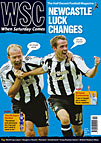
Dear WSC
Does anyone else have deep misgivings about the development of recent years that expects players to put the ball out of play whenever a team-mate or opponent is injured, rather than relying on the referee to stop the game? What could once have been construed as a sporting gesture has been ruined and abused by dishonest players feigning injury and the resulting gesturing of their team-mates, pressuring their opponents to put the ball out of play. It is easy to finger Villarreal as prime proponents of this form of cheating, but there are many other Champions League and Premiership teams who take advantage of the current understanding to break up play and unsettle their opponents. Unless a player has suffered a head or other serious injury requiring immediate treatment, then the game should be allowed to continue until the next stoppage in play. If the team-mates of an “injured” player wish to put the ball out of play so that he can leave the pitch or receive treatment, fine – but they shouldn’t expect their opponents to give them the ball straight back from the resulting throw-in. Give the control back to the referee who, in the absence of a foul, can decide whether to stop the game or let it continue, using a drop ball to restart play if necessary. There are few more irritating sights in football than a team building an attack only to be confronted by their opponents waving and gesturing towards their team-mate sitting on his backside in the other penalty area, causing play to come to an unnecessary halt.
Steve Townsend, Barton-le-Clay
Search: ' World Cup 2006'
Stories
 Romário may be greying but he’ll still score you plenty of goals – provided you don’t ask him to travel or do too much of that training nonsense, explains Robert Shaw
Romário may be greying but he’ll still score you plenty of goals – provided you don’t ask him to travel or do too much of that training nonsense, explains Robert Shaw
Romário da Souza Faria celebrates his 40th birthday on January 29 still mad about goals. His critics might add that he is equally passionate about bars, nightclubs, the beach, bad-mouthing fellow strikers and developing minor knocks on the eve of away trips. But when he claimed his award as the Brazilian national championship’s top scorer in December 2005, Baixinho (Shorty) was speechless. Or rather he told the presenters of the ceremony in Rio’s João Caetano theatre that he did not really need to add any words to back up his impressive goal tally.
 England v Trinidad, France v Togo – former imperial powers playing ex-colonies is a special World Cup theme. Phil Town reports on reaction in Lisbon to a similar game
England v Trinidad, France v Togo – former imperial powers playing ex-colonies is a special World Cup theme. Phil Town reports on reaction in Lisbon to a similar game
Portugal and Angola have met just twice on the football pitch, both trouncings that went Portugal’s way: in 1989 they won 6-0, in 2001 5-1. But if you wanted evidence of the much longer links between the two countries you need only look at the latter game, and the whiff of a colonial war about it.
 As the World Cup approaches, the possibility of violence is a concern but so is the ability of the German police to tell the difference between a fan and a hooligan, writes Paul Joyce
As the World Cup approaches, the possibility of violence is a concern but so is the ability of the German police to tell the difference between a fan and a hooligan, writes Paul Joyce
On November 27, 53 Polish hooligans drove to a wood in Briesen in north-east Germany for a pre-World Cup fight with 45 hooligans drawn from the region’s Hell’s Angels and nightclub bouncer scene, one of whom had been involved in the assault on French policeman Daniel Nivel at the 1998 World Cup. Although German hooligans had previously been keeping a low profile at home, fears of a resurgence of organised violence had already surfaced last March, when more than 40 Germany followers were arrested after rioting during a friendly in Slovenia.
 In the blue corner, Alex McLeish, only keeping his job because of European success; in the maroon corner, Graham Rix, in his job for reasons no one can fathom. Dianne Millen reports
In the blue corner, Alex McLeish, only keeping his job because of European success; in the maroon corner, Graham Rix, in his job for reasons no one can fathom. Dianne Millen reports
Tired of the predictability of your domestic league? Hoping that more than two clubs might be in with a chance of winning it? The recipe is simple – just sell one of your clubs to a wealthy foreign businessman and watch the points (and the crowds) roll in.